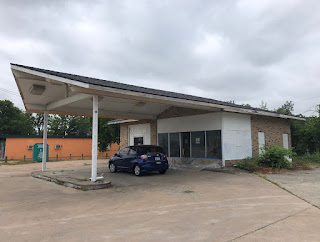Getting the Child out of Hock
The following episode took place about this time last year:
Tamara's number popped onto my cell phone at 4:45 pm. I wondered, "Maybe she needs me to pick something up on the way home."
She did, but not what I thought.
Tamara's number popped onto my cell phone at 4:45 pm. I wondered, "Maybe she needs me to pick something up on the way home."
She did, but not what I thought.
Tamara said, “EMS called the house and talked to Nurse V. Savannah has been taken to the ER. She had a 20 minute seizure on
the bus."
“Crap,” I sighed.
I couldn't go to the hospital directly because I needed to get the wheelchair van. I dashed home and found our home health nurse, Nurse V., prepping the van. Tamara arrived. I changed out of my work clothes.
Tamara said, “Take this snack, you'll need it.You’re going to be there a while.” She spoke from experience. She had spent an entire morning a year earlier, trying to get Savannah out of the ER after a similar seizure incident. She'd made the mistake of going straight to the hospital. So, she had no way of transporting Savannah. She had left increasingly frantic messages on my cell phone (which had died that morning while I was out of town on business... but that is another story.)
Nurse V. and I drove to the Children's hospital and quickly
found Savannah in the ER. A young EMS
student sat wide-eyed in the corner. She'd been assigned to watch Savannah, who was propped up in the hospital bed at such a sharp angle that they had wedged blankets between her and the seizure-padded rails. She looked awkward and uncomfortable. Her head lolled to the side.
“Hey Tweetybird,” I
said. She looked for me.
Nurse V. said,
“Savannah, how are you?”
Savannah smiled. She was hungry and whimpered. It was almost
six o’clock. Her normal feeding time had passed more than hour ago. The EMS student sneaked out without a word. Presumably, she was happy to escape her vigil. Nurse V. changed Savannah’s diaper, hooked
up her feeding, and administered Savannah's normal evening dose of medications, which we had brought (because it would have taken hours to get them ordered at the hospital).
We asked Savannah about her day and the excitement of the ambulance ride. I stroked her cheek. She's non-verbal, so she grimaced or smiled at our various questions.
The ER nurse entered and
said the doctor would be around shortly.
I said, “Great. Can’t happen soon enough. We're ready to leave. Thank you.”
I guess this is where I should tell you that 20 minute seizures are a normal thing for Savannah. At no time was she in any real danger or anything like that. It's just that people get pretty freaked out. It is not everyday that people, outside of our little community of people who live or work with epileptics, witness seizures. The experience can be unnerving, to say the least, so I understand their concern and reaction. It is normal protocol to call EMS for a seizure. School policy is to call EMS after 5 minutes, as it should be. However, after five minutes of seizing, Savannah is sometimes just getting warmed up. When you're accustomed to seeing short seizures daily, and long, hard seizures monthly, you tend to get acclimated to it.
Nurse V. and I settled in and waited.
Nurse V. and I settled in and waited.
Time is measured differently in hospitals. Clocks tick slower, people move as if encased in a clear gel. Entering a hospital feels like entering a time warp. Expressions, such as "shortly" elongate and morph into their opposites. Words like "soon" and "right away" are meaningless filler words. I've even learned that the sentence, "You will be discharged first thing in the morning," actually means in hospital-speak: "Hopefully by 2:00 pm. or the next day at the latest."
The doctor finally came around. He showed his concern for Savannah by wrinkling his brow and using a sincere voice. He told us that Savannah had shown up with a 101 fever and wouldn't be able to leave right away.
I wanted to say, "Whatever. Can I sign for her now and we can leave?" But, I didn't. I was unimpressed by his story, I said, “Sometimes she overheats when she has a seizure-- especially, a long one on the bus when it's 100 degrees outside.”
The doctor finally came around. He showed his concern for Savannah by wrinkling his brow and using a sincere voice. He told us that Savannah had shown up with a 101 fever and wouldn't be able to leave right away.
I wanted to say, "Whatever. Can I sign for her now and we can leave?" But, I didn't. I was unimpressed by his story, I said, “Sometimes she overheats when she has a seizure-- especially, a long one on the bus when it's 100 degrees outside.”
Nurse V. interrupted. She said that she
wanted the doctor to listen to Savannah’s chest.
I withheld my anger. I wanted to spit, "Oh, for crying-out-loud! Are you trying to keep us here! Don't encourage them! What do you not understand about the objective? We want one thing, and one thing only... TO GET OUT OF HERE NOW!" Unfortunately, Nurse V. had been operating under the delusion that Savannah was developing pneumonia because she had swallowed a mouthful of water during an aqua therapy session a month before.
Oh, and just to be clear, she was showing no signs of having pneumonia.
I withheld my anger. I wanted to spit, "Oh, for crying-out-loud! Are you trying to keep us here! Don't encourage them! What do you not understand about the objective? We want one thing, and one thing only... TO GET OUT OF HERE NOW!" Unfortunately, Nurse V. had been operating under the delusion that Savannah was developing pneumonia because she had swallowed a mouthful of water during an aqua therapy session a month before.
Oh, and just to be clear, she was showing no signs of having pneumonia.
The doctor listened to
Savannah’s chest for a long time. He said, “Sounds like she’s got some upper respiratory congestion. I’d like to get an x-ray.”
“Really?” I said. “Is that necessary?”
“With the 101 fever...” the doctor began.
I interrupted, “Yeah, about that fever... can we have
that checked again? She doesn’t feel
hot,” I said. “Look, she's had a lot of
unnecessary testing in her short little life. If this isn’t
necessary, can we just skip it?”
The doctor looked from me to Savannah, who was reclining in a more comfortable position since we arrived. “I understand," he said. "I’ll send the nurse in to check her temperature again.”
“Thank you.”
We waited some more. Nurse V. made small talk.
Savannah yawned.
I yawned.
Savannah yawned.
I yawned.
The ER nurse came around to take Savannah’s temperature again. “I'm going to take it rectally to be sure its accurate."
"Whatever," I sighed. At some point they manage to wear you down, make you surrender with their repetitious rituals and the crazy way they manage to make time stand still.
"Ninety-nine,” the ER nurse said.
"Whatever," I sighed. At some point they manage to wear you down, make you surrender with their repetitious rituals and the crazy way they manage to make time stand still.
"Ninety-nine,” the ER nurse said.
“Okay, fantastic, so can you tell
the doctor we’re ready to go?”
“Sure.”
We waited.
We talked some more.
We exchanged yawns.
We stared off into space when we ran out of conversation.
We stared off into space when we ran out of conversation.
Finally, the doctor
came and told us we could go.
“Can we put her back in her chair?”
“Yes,” the doctor
said.
“Excellent.”
Nurse V. and I disconnected the
blood pressure cuff, the EKG, and the pulse / oxygen monitor without asking permission from anyone. We knew if we waited for an ER nurse to come and unhook all the blinking, beeping contraptions we'd be there another hour. Nurse V. changed Savannah's diaper once more and put her in fresh clothes. The room was so small that we had to position her wheelchair in the doorway.
A new ER nurse and a CNA peered around the wheelchair, “We need to take her
vitals one more time.”
I protested, “But the doctor said
we could get her up.”
“I need to get her
vitals, sir.”
“Fine, have at it. Knock yourselves out.” Resistance is futile. You can refuse, but it only prolongs things... and they know it. Time is their weapon.
The nurse was a tall
bearded guy. He handed me the paperwork
to sign.
We got Savannah up and
wheeled her out. She was tired, but smiled when she saw her van.
It took us four hours to get her out of hock, and we felt a sense of accomplishment because we had been able to get her discharged so fast.
It took us four hours to get her out of hock, and we felt a sense of accomplishment because we had been able to get her discharged so fast.



Comments
Post a Comment